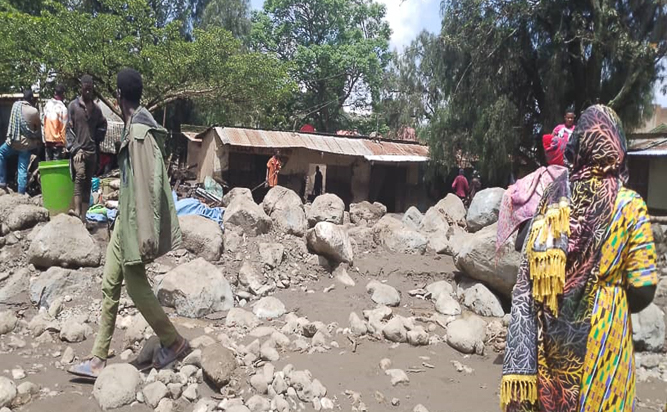Rain or shine, national postal services continue to deliver letters and packages across regions and borders, connecting communities and supporting essential public infrastructure. But what happens when a landslide blocks the only road to a valley, volcanic ash grounds air traffic, or drought leaves waterways unnavigable?
In such cases, agility becomes critical. Postal operators must quickly reroute shipments to minimize delays, especially when carrying life-saving items such as medicine, hygiene kits or food. To support this need, over the past 15 years, the UPU has implemented more than 70 technical assistance projects in over 60 countries to boost disaster preparedness and recovery.Through the Disaster Resilience Fund and the Emergency and Solidarity Fund, the UPU has helped to ensure operational continuity in crisis-affected areas. This includes support for satellite phones to maintain communication with isolated branches; generators and solar panels for backup power; and safety gear such as helmets and high-visibility vests for staff and customers.
AI and the urgency of disaster resilience
AI solutions are already transforming the postal sector, from customer service chatbots to predictive tools for parcel tracking. They also hold significant potential for disaster resilience. Private and public actors alike – such as Google DeepMind, MeteoSwiss and the European Centre for Medium-Range Weather Forecasts – are using AI for weather forecasting and nowcasting, geohazard monitoring, and damage assessment.
For example, the US Geological Survey’s ShakeAlert system detects seismic anomalies and, through partnerships, sends alerts, or triggers safety actions like slowing trains. Similarly, the EU-funded AIDERS (AI for DEcision support via RPAS data analyticS) project uses AI to convert data from drone-based sensors into real-time decision support for emergency responders.
What if these innovations could be adapted to help postal operators navigate crises, safeguarding networks and ensuring deliveries reach affected communities?
Putting people first: human-centred AI
The key lies in human-centred AI (HCAI), which is designed not only for technical performance but also to meet the real needs of its users. In the context of postal resilience, this means creating AI tools that support informed decision-making during emergencies, such as optimizing routes or forecasting supply chain risks.
The foundation of such tools is reliable data. Information on delivery routes, delays and disruptions linked to natural hazards must be gathered across a range of scenarios, over time and at fine geographic scales. To help meet this need, the UPU is implementing its Unified Data Platform, which integrates large-scale postal, trade and aviation datasets and applies machine learning to improve operational efficiency, including emergency contexts.
The UPU also develops key IT solutions such as the Domestic Postal System, Customs Declaration System, UPU Cloud, and EAD solutions. These systems generate structured data which, when combined with technical expertise from the International Telecommunication Union (ITU), can support the development of AI tools tailored to the needs of the postal sector.
However, data alone is not enough. For an AI tool to be truly useful in practice, it must reflect the operational realities of its users. What does a postal manager need to know when a flood isolates a region? In what format should that information be delivered, and how often? These questions can only be answered through close collaboration between postal workers and AI developers.
Strengthening resilience through partnerships
To foster innovation and develop scalable solutions, the Global Initiative on Resilience to Natural Hazards through AI Solutions brings together ITU, the World Meteorological Organization (WMO), the United Nations Environment Programme (UNEP), the UN Framework Convention on Climate Change (UNFCCC), and the UPU. This joint initiative, which kicked off in 2024, promotes interdisciplinary and cross-sectoral collaboration.
It builds on the work of a previous ITU group (the ITU/WMO/UNEP Focus Group on AI for Natural Disaster Management), which hosted an event in 2023 on “Fighting Wildfires with AI-Powered Insights.” This brought together wildlife experts from five continents, along with firefighters, computer scientists and technologists. It provided practical insights into how AI could address the needs of front-line responders.
The Global Initiative continues this work through workshops and research activities that support the co-development of AI tools for disaster resilience and emergency logistics. For postal operators, this includes using AI to identify safer and faster delivery routes under rapidly changing conditions.
Empowering communities through standards
On 8 July 2025, the UPU will share the stage at ITU’s annual AI for Good Global Summit. The workshop will explore how HCAI can strengthen disaster risk reduction, making emergency preparedness more impactful and inclusive (workshop details can be found here). Speakers will include experts in disaster governance, postal logistics, citizen communication, climate policy, early warning systems, environmental science, technology innovation and psychology.
Real-world lessons from the Global Initiative will illustrate how AI can be tailored to support vulnerable communities, particularly in remote or underserved areas, translating early warnings into timely and targeted actions. The initiative also contributes to the development of international AI standards for disaster risk reduction, helping to build capacity and encourage knowledge exchange across regions.
With its extensive network and growing data capabilities, the UPU is uniquely positioned to support this transformation. Postal services already play a critical role in public infrastructure. With the human-centred approach to AI, they can go even further, becoming vital actors in building safer, more resilient and connected societies.
To learn more about the UPU’s Disaster Resilience Fund and the Emergency Solidarity Fund, see here.
Dr Monique M. Kuglitsch
Innovation Manager, Fraunhofer Heinrich Hertz Institute
As Innovation Manager at Fraunhofer HHI, Monique Kuglitsch chairs the Global Initiative on Resilience to Natural Hazards through AI Solutions, jointly convened by ITU, WMO, UNEP, UNFCCC and the UPU. Before joining Fraunhofer, she worked for the American Meteorological Society.
Ms Fumiko Nohara
Senior Expert for Emergencies and Postal Resilience, Universal Postal Union
As Senior Expert for Emergencies and Postal Resilience at the UPU, Fumiko Nohara supports global efforts to strengthen postal responses to natural hazards and crises. She previously served at Japan’s Ministry of Internal Affairs and Communications, bringing experience in IT, telecommunications and postal operations.
